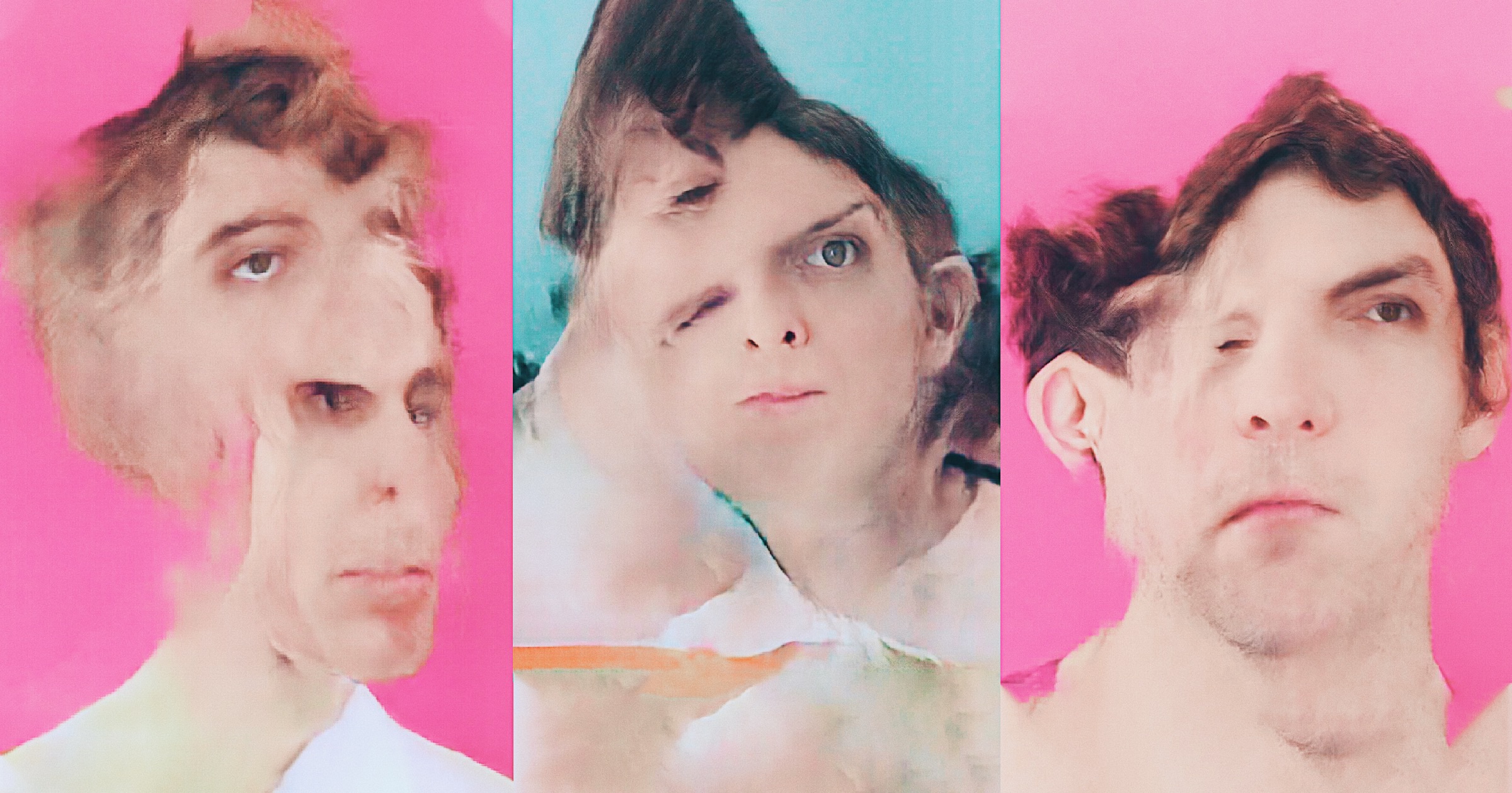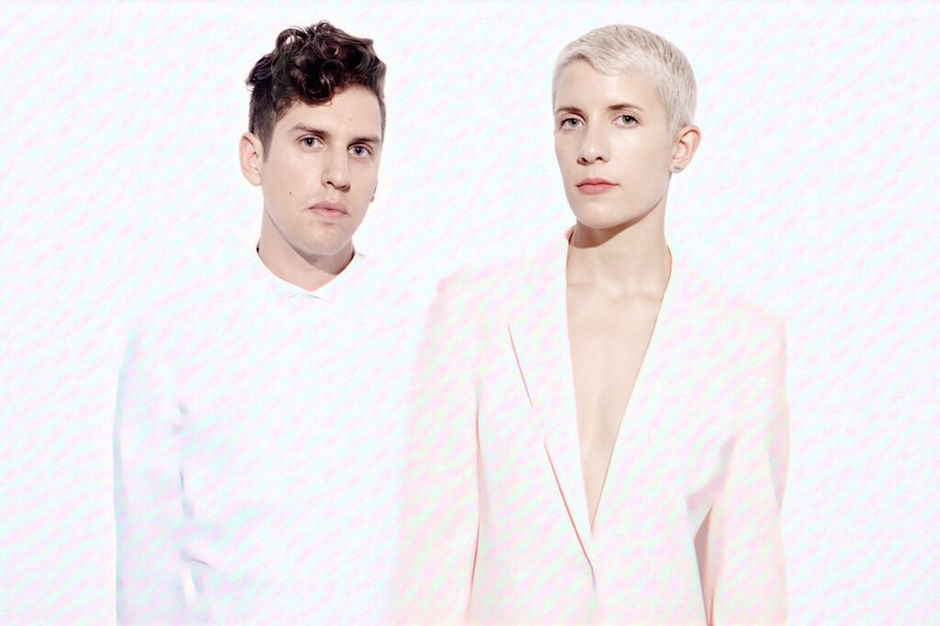“There’s a good I Thought the Future Would Be Cooler moment right there,” says Claire Evans, singer and half of future-forward dance-punk duo YACHT, pointing to someone using a selfie stick and a GoPro simultaneously at Brooklyn Bridge Park. “Once you start having a radar for that stuff, you see it everywhere. Like a giant LED billboard with a Windows error message.” She’s also referencing the album that she and bandmate/producer Jona Bechtolt just released in October, a series of technological commentaries packaged as songs — synthesized studio confections as glossy as the products they’re critiquing. Which makes it all the more ironic that, on this promotional tour, they just performed at the Soho Apple Store. “We’re explicitly making music that’s critical of [Apple],” says Evans. “It’s very strange.”
And yet, no stranger than a world in which hoverboards and bodegas exist side-by-side, another scene YACHT witnessed in New York City and which may inform whatever musical project they come up with next; as of right now, the “counter-culture of the hoverboard” looks like a promising lyrical topic. Since 2009’s electrifying See Mystery Lights, YACHT have been putting to tape the utopian/dystopian themes they debate and intellectualize in real life: In 2013, they and Marc Maron ripped up the dance floor with “Party At the N.S.A.,” a cheeky roast of the much-criticized government organization — and then, in a parting rim shot, all song download revenues went to the Electronic Frontier Foundation. Finding unique angles for single releases informed I Thought the Future Would Be Cooler (after some prodding, they tell me it was originally going to be named Drones) which at times reads more like a collection of George Saunders’ satirical short stories than an album.
“Each song deserves its own representation and needs to be thought of individually,” says Evans, 30, who has also written extensively about science, tech, and the media for platforms like VICE‘s Motherboard. That’s one of the reasons the “L.A. Plays Itself” video starts, ah, playing itself here when Uber fares surge: YACHT synced the clip’s rollout to the company’s pricing algorithm. “Everyone thought that was a partnership with Uber, when it was explicitly designed to make fun,” says Bechtolt, 34. They had hoped that in light of such publicity, the company might donate its surge pricing to help Los Angeles’ homeless population, and “crickets,” he says. “We never heard anything back.”

Also Read
YACHT – “(Downtown) Dancing”
At least they’re never at a loss for things to say themselves. Brightened by the additional Vitamin D they’ve been absorbing since moving from Portland, Oregon to Los Angeles (“Being in sunshine is amazing,” says Bechtolt), YACHT keep up a steady stream of conversational 1s and 0s about plans to prank LinkedIn and their comments on YouTube comments. It’s all SPIN can do to not get left behind.
When did the “future,” as it’s represented on the album, arrive for you? It seems like you’ve always have an eye towards the dystopian.
Claire: I never feel like the future’s arrived. Sometimes I’ll look at my phone like, “Wow, I’m holding a flat thing that has all the information,” but I can’t get shocked by it in the way that I would like to be.
Jona: There are moments when we have that feeling of looking back, like, “Okay, imagine your 13-year-old self.”
Claire: When we were watching the Democratic debates, if you had shown this to me as a teenager and been like, “The wife of the president is talking about marijuana legalization at an event that is sponsored by a website for making friends, and it’s streaming on our television from a phone, and the other guy’s talking about socialism,” that feels like the future in such a weird way.
Jona: I thought of Back to the Future as the future, for sure.
Claire: It’s hard to separate what I imagined the future would be like from what I imagined my future would be like. I had fantasies about where I’d be living and what I’d be doing, but I don’t think I thought of it in a holistic context until I was older. I had one adulthood fantasy that was, like, sitting on a fire escape eating Chinese food.
When and how did you guys start conceiving of the idea for this album? Did you think of each song at once?
Jona: We make songs that are eight or nine minutes long and then end up editing them down to concise little pop moments. On [the title track] there was an extra verse, and Claire improvised that line which is now the album title, and I’d be like, “That’s awesome! Keep saying it again.” There are three or four snare drums on there that I recycled from “Party at the N.S.A.” I put a microphone directly on the snare drum and a blanket on top of it and hit it, and I couldn’t reproduce that, so I just used it again.
Have you faced any kind of adversity as a woman in the industry that specifically informed “War On Women?” That topic has been a really big conversation in 2015.
Claire: No one asks about that song! It makes me so mad. When I write for the web, tweet, post images, make songs, I’m always thinking, “I hope someone doesn’t f**king start trolling me, or I don’t get weird s**tty emails, or I don’t get abused on the Internet because of this,” because I write a lot about feminism. I think the fact the anyone even produces art anymore in the face of comment culture is commendable already, and then women have this extra level of very legitimate fear often for physical safety. When I think about the future being s**tty, that’s a big part of it: the lack of protection for women online, generally speaking.
Did you also kind of try to game the press cycle a little bit by saying what all your songs were about on BuzzFeed?
Claire: Oh, f**k yeah. We’ve done that forever. There’s a bunch of stuff about us on the Internet that is 100 percent fictional. We realized if you wrote your own press release and put whatever you want in it, that 99 percent of music press — no offense — would reprint it, like in the golden age of the music blog. We seeded all these weird lies about our band that still are on our Wikipedia page and stuff.
Like which ones?
Jona: That we’re named after an after school program that I did. I think actually SPIN is the source that’s cited on Wikipedia of that being real. We’re f**king with LinkedIn right now and it’s pretty fun.
Claire: Jona made a profile for the record and then added the entire music industry as a connection.
In an interview from a little while ago, you said, “Technology is just a tool,” but there are risks with our technology; like self-driving cars, which could possibly harm us in certain circumstances because they’ve been programmed to follow rational logic. At what point do you think we have to be wary of technology’s risks?
Claire: I mean, language is a technology, and it can be used for good and it can be used for bad. A pencil is a technology, a hammer is a technology — technology’s just an extension of human impulse. It’s becoming more complicated now that there are other entities we have to program morality into so things don’t go horribly wrong, but we don’t have a full articulation of what morality is and how it works. I still stand by the idea that technology is genuinely what we make of it, but I think as a collective force humanity has historically done a lot of really bad things with its tools.
Jona: Check out YouTube comments.
Do you feel like the drought in L.A., which is a major problem over there, has played into any ideas you’ve had about environmental crises as part of the future, like global warming?
Claire: You always feel like things are a bit on the edge of falling apart. There’s wildfires or droughts or mudslides and you feel like, “This is the beginning of the end.” But I think it helps you enjoy life a bit more because you’re kind of partying as the ship’s going down. [Laughs.] But also, Californians are starting to be more mindful of resources and more economical and industrious about those things.
Jona: I don’t know if you could say that about all Californians.
Claire: Californians have reduced their water usage significantly since the drought.
Jona: There’s still people like watering the sidewalks.
Claire: Sure, there’s always gonna be idiots, but — it’s getting better.




